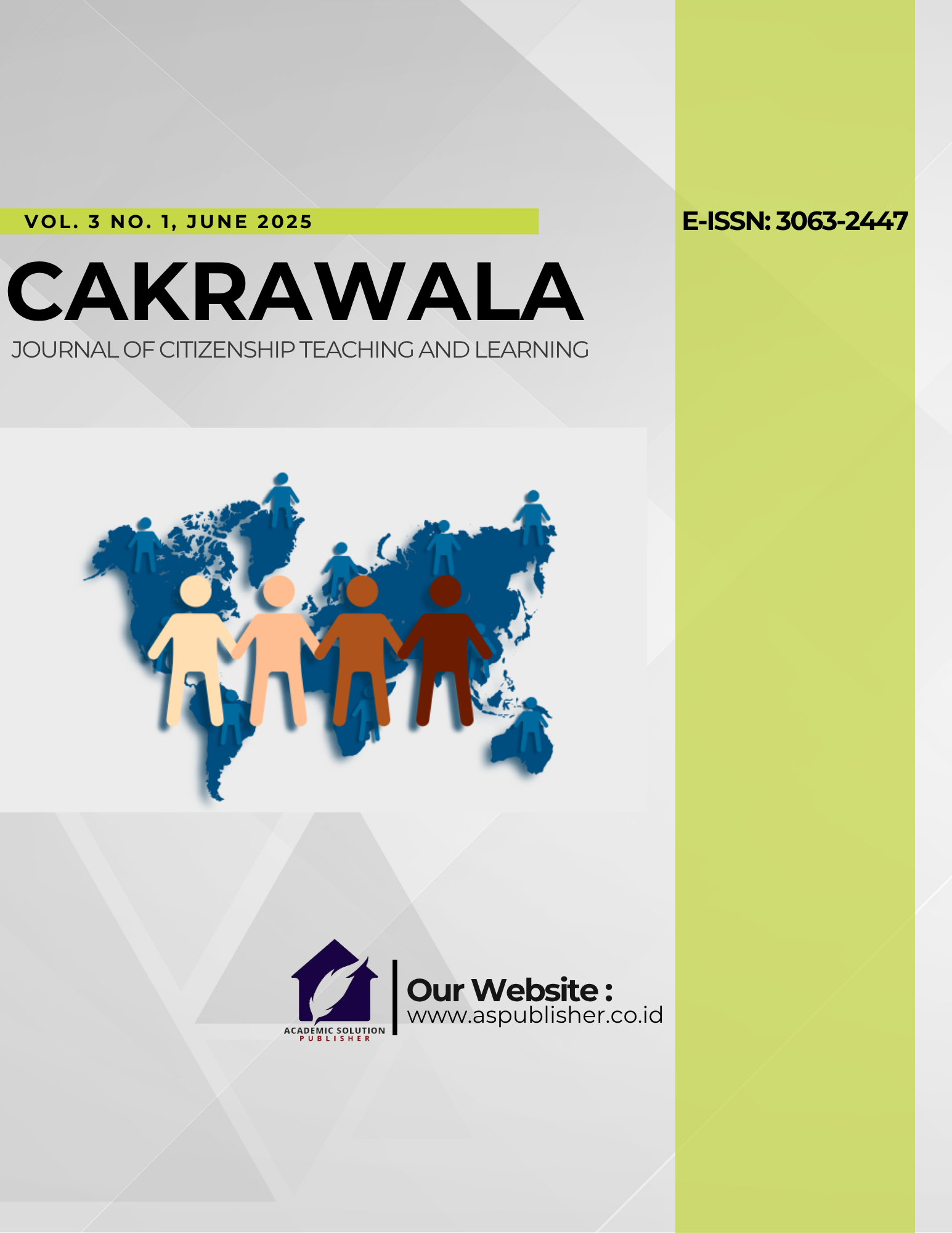The Effectiveness of Outdoor Learning-Based Teaching Methods in Enhancing the Understanding of Geographic Concepts
DOI:
https://doi.org/10.70489/9m3ss876Keywords:
Outdoor Learning, Geography, Concept Understanding, Learning MotivationAbstract
This study aims to examine the effectiveness of the outdoor learning-based teaching method in improving the understanding of geographic concepts among eleventh-grade students at SMA Negeri 1 Dolok Pardamean, Simalungun Regency, North Sumatra. The study employed a quantitative approach with a quasi-experimental design using the nonequivalent control group design, involving two groups: the experimental group taught through the outdoor learning method and the control group taught through conventional methods. The research instruments consisted of written tests and observation sheets. Data were analyzed using descriptive statistics and a t-test to determine significant differences between groups. The findings revealed a significant improvement in students’ understanding of geographic concepts when taught through the outdoor learning method. The average posttest score of the experimental group reached 82.70, higher than that of the control group, which was only 74.15. The t-test result showed a t-value of 4.52 with a significance level of p < 0.001, confirming a significant difference between the two groups. Observations also indicated that student engagement in the experimental group was higher (85%) compared to the control group (60%), suggesting that this method is effective in enhancing students’ motivation and participation.
References
Apriyanti, E., Fatria, E., Priadi, A., & Wilti, I. R. (2025). 21st Century Environmental Education: A Strategy for Transforming Community Behavior in Facing the Environmental Crisis. IJIS Edu: Indonesian Journal of Integrated Science Education, 7(1), 14-39.
Apriyanti, E., Asrin, A., & Fauzi, A. (2023). Model pembelajaran realistic mathematics education dalam meningkatkan pemahaman konsep matematika siswa sekolah dasar. Jurnal Educatio Fkip Unma, 9(4), 1978-1986.
Asad, M. M., Naz, A., Churi, P., & Tahanzadeh, M. M. (2021). Virtual reality as pedagogical tool to enhance experiential learning: a systematic literature review. Education Research International, 2021(1), 7061623.
Azizah, S. U., & Hardi, O. S. (2024). UPAYA MENINGKATKAN HASIL BELAJAR KOGNITIF GEOGRAFI SISWA KELAS X MELALUI PENERAPAN SOAL EVALUASI BENTUK URAIAN DI SMAN 61 JAKARTA. Jurnal Geografi, 20(1), 10-17.
Azizi, H., Sukardi, S., Wadi, H., Suryanti, N. M. N., & Fitriah, F. (2025). Pengaruh Model Pembelajaran Kooperatif Tipe Gallery Walk Berbantuan Media Poster Terhadap Partisipasi Belajar Peserta Didik. Journal of Classroom Action Research, 7(3), 933-940.
Brookfield, K. (2022). ‘Nature-enhanced learning’and geography education. Journal of Geography in Higher Education, 46(3), 327-342.
Chang, C. H., & Kidman, G. (2024). Teacher identity and geographical & environmental education: why it matters. International Research in Geographical and Environmental Education, 33(4), 261-266.
Damaševičius, R., & Sidekerskienė, T. (2024). Virtual worlds for learning in metaverse: A narrative review. Sustainability, 16(5), 2032.
Gregory, K. J., & Lewin, J. (2023). Big ideas in the geography curriculum: Nature, awareness and need. Journal of Geography in Higher Education, 47(1), 9-28.
Larsen, T., Gerike, M., & Harrington, J. (2022). Human-environment thinking and K-12 geography education. Journal of Geography, 121(1), 34-46.
Lee, H., Woo, D., & Yu, S. (2022). Virtual reality metaverse system supplementing remote education methods: Based on aircraft maintenance simulation. Applied Sciences, 12(5), 2667.
Lundin, M., Bergviken Rensfeldt, A., Hillman, T., Lantz-Andersson, A., & Peterson, L. (2018). Higher education dominance and siloed knowledge: a systematic review of flipped classroom research. International Journal of Educational Technology in Higher Education, 15(1), 1-30.
Marougkas, A., Troussas, C., Krouska, A., & Sgouropoulou, C. (2023). Virtual reality in education: a review of learning theories, approaches and methodologies for the last decade. Electronics, 12(13), 2832.
Susilawati, S. A., & Sochiba, S. L. (2024). Pembelajaran outdoor study dalam mata pelajaran Geografi: Systematic review. Jurnal Pendidikan Geografi: Kajian, Teori, dan Praktek dalam Bidang Pendidikan dan Ilmu Geografi, 27(1), 5.
Setiawati, E., Wijayanti, P. S., Rianto, R., & Sukasih, S. (2023). Efektivitas pembelajaran outdoor learning process terhadap peningkatan kerja sama, motivasi belajar, dan hasil belajar ips siswa sekolah dasar. Jurnal Paedagogy, 10(1), 115-125.
Syawaludin, M., Aminuyati, A., Wiyono, H., Karolina, V., & Atmaja, T. S. (2022). EFEKTIVITAS MODEL PEMBELAJARAN OUTDOOR STUDY DALAM MENINGKATKAN HASIL BELAJAR PESERTA DIDIK PADA PEMBELAJARAN IPS KELAS VIII MTS NEGERI 1 MEMPAWAH HILIR. Jurnal Pendidikan dan Pembelajaran Khatulistiwa (JPPK), 11(12), 3461-3467.
Tammets, K., Ley, T., Seitlinger, P., & Eisenschmidt, E. (2024). School culture and teaching practices for the effective student-centred learning during emergency remote teaching. European Journal of Teacher Education, 1-23.
Van Kraalingen, I. (2023). A systematized review of the use of mobile technology in outdoor learning. Journal of Adventure Education and Outdoor Learning, 23(3), 203-221.
Wulandari, S., Azis, M., & Hamzah, H. (2018). Pengaruh media berbasis lingkungan terhadap hasil belajar murid kelas V SD Inpres Karunrung. JKPD (Jurnal Kajian Pendidikan Dasar), 1(2), 106–120.
Downloads
Published
Issue
Section
License

This work is licensed under a Creative Commons Attribution-ShareAlike 4.0 International License.










